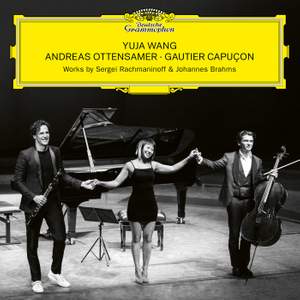BRAHMS; RACHMANINOV Cello Sonatas (Gautier Capuçon)
View record and artist detailsRecord and Artist Details
Genre:
Chamber
Label: Deutsche Grammophon
Magazine Review Date: 11/2022
Media Format: CD or Download
Media Runtime: 82
Mastering:
DDD
Catalogue Number: 486 2389

Tracks:
| Composition | Artist Credit |
|---|---|
| Sonata for Cello and Piano No. 1 |
Johannes Brahms, Composer
Gautier Capuçon, Cello Yuja Wang, Piano |
| Trio for Clarinet/Viola, Cello and Piano |
Johannes Brahms, Composer
Andreas Ottensamer, Clarinet Gautier Capuçon, Cello Yuja Wang, Piano |
| Sonata for Cello and Piano |
Sergey Rachmaninov, Composer
Gautier Capuçon, Cello Yuja Wang, Piano |
Author: Mark Pullinger
One of the features of the Verbier Festival is its throwing together of artists who may never have performed together before into chamber recitals in the local church, a musical ‘blind date’. One such match, in July 2013, saw Yuja Wang and Gautier Capuçon paired together for the first time – a recital still available to stream on Medici – and it has blossomed into a fruitful long-term relationship. The pair have performed together around the world and now, with Capuçon guesting on DG, they have finally recorded their first duo recital. Well, almost a duo recital, for their musical tête-à-tête is eventually gatecrashed by Andreas Ottensamer, another musical friend, for Brahms’s Clarinet Trio.
That Verbier recital featured Rachmaninov’s Cello Sonata in G minor and it forms the central pillar of this album. It’s a work that requires virtuoso playing from the pianist, very much billed as an equal partner, as one would expect from this pianist-composer, and Wang does not disappoint. She is fabulous in Rachmaninov and her playing here is muscular where needed, bold and dramatic, but also light and responsive, quicksilver in the second movement.
Capuçon has a lean, sinewy tone, although DG spotlights the cello so that he often sounds beefier than the piano. He has recorded the sonata before, with Gabriela Montero (Erato, 2/08), but this new account is preferable, tauter in the Allegro moderato of the first movement, and Wang presses on with the Andante at a much more purposeful tread (their coda is gorgeous). Capuçon’s ‘rosiny’ gruffness in the Allegro scherzando opens up into a fine singing tone when the cello soars up into the treble clef. He and Wang revel in the sonata’s bell-like sonorities and the whiff of Orthodox incense.
The bulk of the programme is taken up with Brahms. What I enjoy here is how two big musical personalities don’t try to compete against each other. The E minor Cello Sonata is very satisfying, beautifully paced; the crepuscular first-movement coda really glows. It’s almost as if they breathe together. Compared with Steven Isserlis and Stephen Hough (Hyperion, 1/06 – my favourite accounts of the two Brahms cello sonatas), Capuçon and Wang have a keener edge, their Minuet and Trio dancing along at quite a swift pace, although Isserlis employs a slightly richer palette of colours.
Brahms’s Clarinet Trio receives a warm rendition. I enjoy Ottensamer’s playing very much and his creamy tone blends beautifully with his colleagues here. His dynamic shading in the Adagio is sensitive, matched by Capuçon’s response. Unhurried but never mawkishly autumnal, there’s a lovely sense of three friends conversing over a late-night brandy. A deeply satisfying album.
Discover the world's largest classical music catalogue with Presto Music.

Gramophone Digital Club
- Digital Edition
- Digital Archive
- Reviews Database
- Full website access
From £8.75 / month
Subscribe
Gramophone Full Club
- Print Edition
- Digital Edition
- Digital Archive
- Reviews Database
- Full website access
From £11.00 / month
Subscribe
If you are a library, university or other organisation that would be interested in an institutional subscription to Gramophone please click here for further information.




